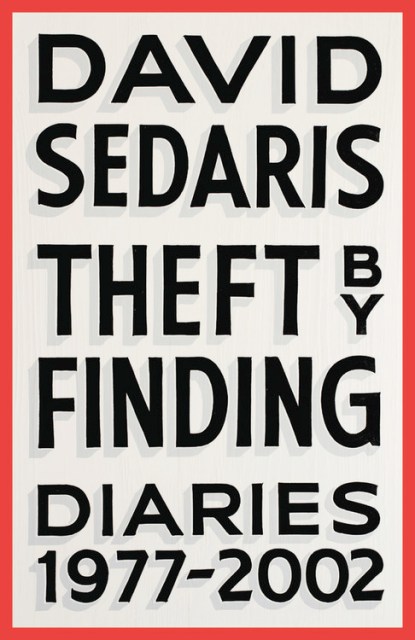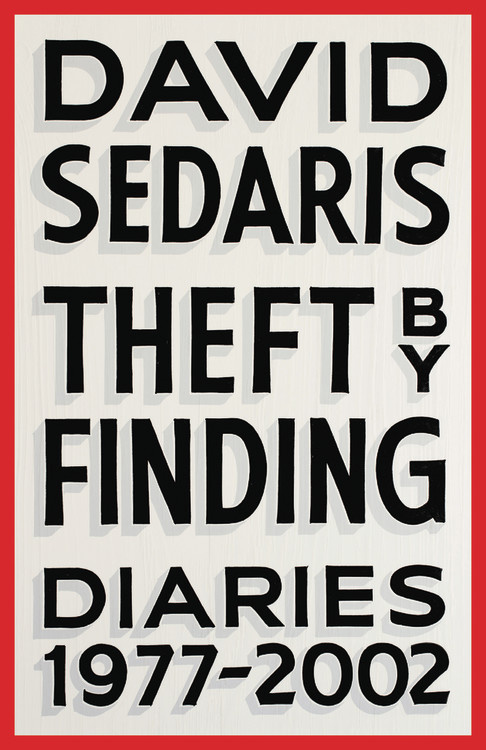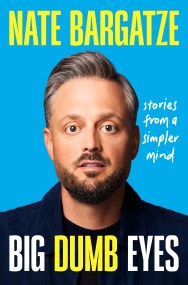By clicking “Accept,” you agree to the use of cookies and similar technologies on your device as set forth in our Cookie Policy and our Privacy Policy. Please note that certain cookies are essential for this website to function properly and do not require user consent to be deployed.
Theft by Finding
Diaries (1977-2002)
Contributors
Formats and Prices
- On Sale
- May 30, 2017
- Page Count
- 528 pages
- Publisher
- Little, Brown and Company
- ISBN-13
- 9780316154727
Price
$28.00Price
$36.50 CADFormat
Format:
This item is a preorder. Your payment method will be charged immediately, and the product is expected to ship on or around May 30, 2017. This date is subject to change due to shipping delays beyond our control.
Buy from Other Retailers:
An NPR Best Book of 2017
An AV Club Favorite Book of 2017
A Barnes & Noble Best Book of 2017
A Goodreads Choice Awards nominee
David Sedaris tells all in a book that is, literally, a lifetime in the making.
For forty years, David Sedaris has kept a diary in which he records everything that captures his attention-overheard comments, salacious gossip, soap opera plot twists, secrets confided by total strangers. These observations are the source code for his finest work, and through them he has honed his cunning, surprising sentences.
Now, Sedaris shares his private writings with the world. Theft by Finding, the first of two volumes, is the story of how a drug-abusing dropout with a weakness for the International House of Pancakes and a chronic inability to hold down a real job became one of the funniest people on the planet.
Written with a sharp eye and ear for the bizarre, the beautiful, and the uncomfortable, and with a generosity of spirit that even a misanthropic sense of humor can’t fully disguise, Theft By Finding proves that Sedaris is one of our great modern observers. It’s a potent reminder that when you’re as perceptive and curious as Sedaris, there’s no such thing as a boring day.
David Sedaris tells all in a book that is, literally, a lifetime in the making.
For forty years, David Sedaris has kept a diary in which he records everything that captures his attention-overheard comments, salacious gossip, soap opera plot twists, secrets confided by total strangers. These observations are the source code for his finest work, and through them he has honed his cunning, surprising sentences.
Now, Sedaris shares his private writings with the world. Theft by Finding, the first of two volumes, is the story of how a drug-abusing dropout with a weakness for the International House of Pancakes and a chronic inability to hold down a real job became one of the funniest people on the planet.
Written with a sharp eye and ear for the bizarre, the beautiful, and the uncomfortable, and with a generosity of spirit that even a misanthropic sense of humor can’t fully disguise, Theft By Finding proves that Sedaris is one of our great modern observers. It’s a potent reminder that when you’re as perceptive and curious as Sedaris, there’s no such thing as a boring day.
Genre:
-
PRAISE FOR THEFT BY FINDING:Patton Oswalt, New York Times Book Review
"Starve and Struggle. Feast. Bloat. These are the three stages that all artists - with some variation - go through in their careers...So it's encouraging to read 25 years of David Sedaris's diaries, and not just because he manages to defeat Bloat. It's helpful to see that a voice as original, hilarious and sometimes as infuriating as his was put through the same Struggle and Starve meat grinder that most of us go through...No one escapes Bloat, but many survive it. Maybe not with the grace, whining, hilarity and eye-rolling that Sedaris does. But through all 25 years of "Theft by Finding" - of soap opera addictions and spider feeding, family kookiness and language lessons - Sedaris's developing voice is the lifeline that pulls him through the murk."
-
"If it's hard to be funny, it's an astounding feat to stay funny--wildly, wickedly, ingeniously so--for more than twenty years. Yet David Sedaris has somehow pulled it off, in exhilarating essays that zero in on the absurd and the poignant with eviscerating wit and radiant humanity....Fans will no doubt delight in the entries that will turn into Sedaris's most beloved essays...We're treated to a portrait of the artist as a young man, albeit one with an old and singular soul."Fiona Maazel, O, The Oprah Magazine
-
"A standout... Whether he's in an IHOP in Raleigh or his apartment in the 6th arrondissement of Paris, his eye for the absurd and the vulgar is infallible and his deadpan prose style inimitable...Here, the relatively artless diary entries, short and long, sequenced and non sequitur, add up to something we've never gotten before--a big, juicy narrative arc. It comprises 25 years of an essentially heartwarming success story, any potential ickiness kept in check by Sedaris's judicious minimalism."Marion Winik, Newsday
-
"Mesmerizing... Delightful... Sedaris describes the world around him... the vast and splendid array of human life that can be observed at IHOP, or the vagaries of fruit picking... Reading Theft by Finding is like watching a favorite play from behind the scenes, in the company of a friend who can identify what is absurd and heartbreaking and human about every person on stage."Annalisa Quinn, NPR
-
"Sedaris, a master of incisive and comic cultural criticism, is about to get more personal than ever...Theft by Finding reveals intimate details of this literary luminary's life and mind--all told with his singular sense of humor."Harper's Bazaar
-
"Sedaris fans will thrill to this opportunity to poke around in the writer's personal diaries, which he has faithfully kept for four decades and used as raw material for his hilarious nonfiction as well as his performances."Paul S. Makishima, Boston Globe
-
"If you've had the good fortune of seeing Sedaris on tour, you've probably heard him read from one of his snarky and hilariously solipsistic diary entries. Finally, they're collected in one place for the first time."Entertainment Weekly
-
"Randomly open to any page of Theft by Finding and you'll find a gem... Sedaris's gift is to make you stop and think one moment and laugh out loud the next."Rob Merrill, Associated Press
-
"Here, in these as-it-happened accounts and jottings, is a rich chunk of the mother lode from which David Sedaris has mined his personal essays and performances. The extracts in Theft by Finding cover what may be called the disconsolate IHOP years, when he was a college dropout, rootless casual worker and aspiring artist, and those during which he became a celebrity.... The appeal of these diary entries lies in their spareness and in Sedaris's boundless relish for the absurdity of life.... The Sedaris of these diaries is, above all, a connoisseur of annoying things and of bothersome and downright dreadful people."Katherine A. Powers, Washington Post
-
"This is Sedaris, who can be wickedly funny as well as deliciously insightful about modern mores - so the nuggets are big and shiny and well worth panning for... His eccentric existence is eminently enthralling."David Holahan, USA Today
-
"The thrill of Sedaris's nonfiction lies in the absurd details of his memories, burnished with...polish and comic timing...Now we'll finally have access to the raw material -- fragments of the writer's personal diaries that you might recognize from the banter in his prolific and hilarious live readings."Boris Kachka, New York
-
"Of course you're going to buy, read, laugh, ponder, read. He is one of our best comic writers, one of our most thought-provoking, and--who knew?--a dedicated diarist."John Timpane, Philadelphia Inquirer
-
"Sedaris's diaries are the wellspring for his cuttingly funny autobiographical essays, and he now presents a mesmerizing volume of deftly edited passages...Sedaris is caustically witty about his bad habits and artistic floundering...A candid, socially incisive, and sharply amusing chronicle of the evolution of an arresting comedic artist."Donna Seaman, Booklist (starred review)
-
"Raw glimpses of the humorist's personal life as he clambered from starving artist to household name...Though the mood is usually light, the book is also a more serious look into his travails as an artist and person...A surprisingly poignant portrait of the artist as a young to middle-aged man."Kirkus (Starred Review)
-
"A David Sedaris book is always a welcome addition to any personal library - his hilarity, his self-deprecation, his compassion for (and amusement with) the human condition, and his clear joy at making his readers laugh out loud are all what make a David Sedaris book great."E. Ce Miller, Bustle
-
"Peak Sedaris...A real journey, and catnip for his most loyal fans."Jinnie Lee and Maura M. Lynch, WMagazine.com
-
"For those curious about the mind of a comic genius, this is a great place to start."Melissa Kravitz, amNewYork
-
"Filled with rich and unfailingly sharp observations...There are moments of sadness...but this is not a sad book; instead, it's a gloriously weird one...This is a diary that shows us how Sedaris's powers of observation and his intense investment in his own perspective have enriched his life and, by extension, ours."Kelly Blewett, BookPage
-
"Scintillating... Sedaris is a latter-day Charlie Chaplin: droll, put-upon but not innocent, and besieged by all sorts of obstreperous or menacing folks... Sedaris's storytelling, even in diary jottings, is consistently well-crafted and hilarious."Publishers Weekly (Starred Review)
-
"Wildly entertaining....This book is flat-out memerizing."Laurie Hertzel, Minneapolis Star-Tribune
-
"A summer in which there is a new Sedaris book is the very definition of a good summer."Ann Patchett, author of Commonwealth
-
"Diary entries shouldn't be this good, but considering Sedaris's output, it's not surprising that this collection is a worthy addition to his name...Like much of Sedaris's deceivingly simple prose, the enjoyment comes not from its very basic conceit but its sharp observations and bone-dry humor."Caitlin PenzeyMoog, A.V. Club
-
"The Sedaris diaries are laced with snark, wit and trenchant observations, personal and public."Jim Higgins, Milwaukee Journal-Sentinel
-
"As brilliant and hilarious as anything Sedaris has previously published."Zack Ruskin, SF Weekly
Newsletter Signup
By clicking ‘Sign Up,’ I acknowledge that I have read and agree to Hachette Book Group’s Privacy Policy and Terms of Use







